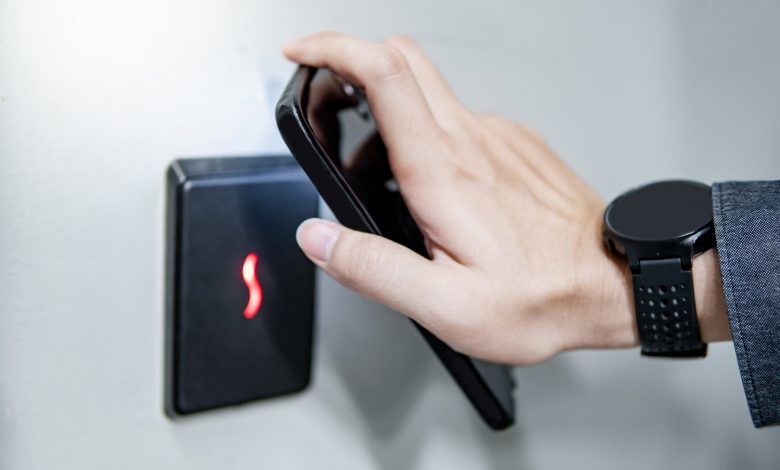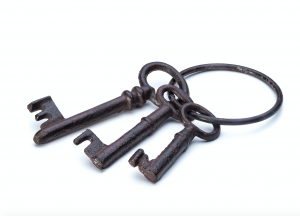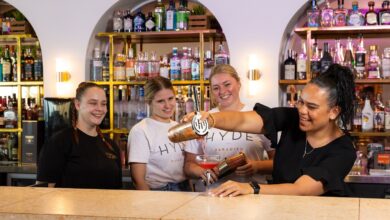
Lock technology key to great improvement in hotel security and service
Entering a hotel room has come a long way from receiving a tagged key at reception
Metal keys and locks were the primary security system for most properties, just as the horse was the main mode of transport, and yelling was the main form of long-distance communication!

But the technological revolution over the last two centuries has changed everything about the way we live, the way we travel and the way we protect ourselves.
Accommodation room keys are now mostly pieces of plastic that are coded with remote control technology interfaced back to property management systems. When they are held near a door the front desk immediately knows that someone has entered the room.
Our mobile phones can also be programmed to work as a hotel room key, and the use of contactless door locks has been accelerated by the technological changes demanded by COVID-19 social distancing rules.
Tor Sørnes, a Norwegian inventor, patented the first electronic keycard lock in 1975. His breakthrough opened the door for a global market in electronically programmable locks, and a huge range of authentication methods soon became available.
Although slow to take off, developments in contactless hotel lock technology have accelerated in recent times. While most hotel chains operate with familiar key card technology, an increasing number are now embracing technology based upon the smartphones most of us carry with us 24/7.

Jodi Brown, General Manager of the Eos by SkyCity in Adelaide, said keyless room entry through smartphones and in-room tablets were ways her property was leading the technological revolution.
Eos is one of a number of properties that now give guests the opportunity to access their hotel rooms directly through their mobile devices. The technology involves phone keys with the additional security of 128-bit encryption, a bank-level standard that is essentially uncrackable.
Tourism Accommodation Australia CEO, Michael Johnson said contactless room locks were common in the hotel industry before COVID, but that the pandemic had further “expedited” their uptake.
“They make the operation of a property that much easier,” Mr Johnson said, “because the keys are interfaced back to property management systems.”
He said that now in most hotels when a guest tapped on a door lock with an access key, the front desk immediately knew that the guest had entered the room.
“If the electronic key is lost or misplaced the front desk can re-program a new card,” Mr Johnson said.
“With a metal key there was always the danger it could be used for break-ins. With the new technology, staff and security people know when guests are in rooms – or not.”
Mr Johnson said contactless electronic locks were also a boon for cleaners servicing guestrooms.
“Because of the technology they know not to knock when the guests are in the room so that the guests are not disturbed,” he said.
“The lock technology has seen a great improvement in both security and service for hotels.’’
Electronic contactless locks are more expensive to install than metal key and lock systems, but they provide better security for guests. Once operational they are much cheaper to maintain.
As an industry there has been a significant cost barrier to investing in contactless technology, but the COVID pandemic forced an uptake on all manner of contactless tools.
The same kind of technology now common in hotel door locks is also used widely in apartments, Airbnb, and rental houses.

SALTO Systems Vertical Manager Hospitality, Tim Kneebone says that the post-COVID recovery of the hospitality industry is being led by lowering operating costs through smart technology solutions.
“Smart electronic access control is one of these,” he said.
“It plays an integral role in allowing guests access to their accommodation and communal facilities, while saving staff time, saving the cost of credentials through the mobile key, and creating a better overall experience for the guest.”
Talking about the use of locking technology post COVID he said: “Cloud-based mobile key technology allows you to manage the accommodation business from any location, covering check-in, check out, re-rooming and common facility access. In a full-featured system, there are even contact tracing reports available, so you can tell where the guest has been and when. With audit trails and flexible access management, operators have greater peace of mind.”
And on latest trends: “The industry is starting to capitalise on high-level integrations with various smart hospitality technologies that can provide a superior guest experience. Also, a wireless access control system that when integrated into (for instance) in-room temperature control, can provide significant energy savings and increase profit per available room (GOPPAR).
Finally, Tim wants you to know that “investing in upgrading old door locks to wireless electronic access control not only provides your guests with an exceptional overall experience, but also directly improves revenue.
He explained: “Electronic Access Control does this by lowering operational costs through automation and integration, all while increasing security.”

Michael Benikos, Managing Director, ASSA ABLOY Global Solutions Australia, told us that the advent of IOT has effectively changed the game and as Forbes Magazine said a few years ago “Anything that can be connected will be connected”.
He said: “The door lock being a central part of a hotel is no exception and as such we have developed integrations with various systems using IOT solutions to connect the locks, centrally providing additional reporting and functionality. This also enables the locks to send events to guest room management systems for use in occupancy detection and welcome scenes when guests arrive.”
On the impact of Smart Hub Integration, he explained: “The concept of ‘smart rooms’ where a ‘hub’ has devices such as door locks, air conditioning, televisions, lighting, and voice control connected to it, which activate devices in the room based on occupancy has been around for quite a few years, but IOT technology has made it much easier to deploy.
“Sustainability is a global issue and with the race to net zero hotels can use these systems to reduce energy consumption while also helping the environment and saving them money.”
Contactless technologies have been valuable to the sector throughout the pandemic. He said: “Since COVID mobile access assisted many hotels to keep guests safe by further limiting exposure to germs and reducing touchpoints, as the check-in experience could be moved to the guest’s smartphone.
“Mobile Access which uses BLE ((Bluetooth Low Energy) to provide guests with the ability to digitally check in and access their rooms through their own personal devices, has been around since 2014.
“During 2021 we partnered with Apple and Hyatt to expand mobile access to use NFC, which puts the room key in the Apple Wallet improving the customer experience even further. The wallet is easier for customers to use, even more secure and will work for up to five hours when a phone loses battery power.
Michael advised, before changing your locking technology it’s crucial to do your research. Make sure the company supplying your locks has a plan for future development and can support the current hardware for 10 to 15 years while having the ability to add new features.
He added: “Technology is changing rapidly so the lock hardware should be upgradeable to easily add new features. Owners do not want to spend money on new door locks every four to five years.”

Mark Samuelson, Director Codelocks says the main change in door locking technology in the last few years has been the ability to integrate with the many online booking platforms and in- house automation technology.
He said: “This can allow guests to pre-book accommodation, check-in, enter the guest room and depart all online. With good integration you can then custom the room to the guests needs.”
When asked what locks work best for different accommodations and their PMS, he said: “For many smaller regional hotels and motels that are going to be cost conscious the saying, ‘keep it simple’ will always be best. Something that can easily integrate with the online booking system, with a manual key override for insurance and minimal on-going fees or complex support.
“For the larger hotels and motels, the options for integration with your other internal platforms is constantly evolving however, this does come at a cost not only to implement and train but to service and support.”
He advised: “Look at your audience and this will help to establish what is right for you.”
Despite the rise of contactless door locking technologies due to COVID, he does not believe the sector will ever see “truly contactless door locking”, given the need to push or turn something to enter the room.
“However,” he said: “You can find technology that can be applied to the locks, a clear coating, that combats SARS-CoV-2 coronavirus (COVID-19). It can reduce bacterial growth by up to 99.96 percent, which provides an additional measure of protection over sanitisation.”
On the latest locking trends, he said: “In many cases the key has been replaced with codes and cards and now with the march of virtual keys, the technology behind it will allow you to have seamless integration to other internal systems.”
Finally, his message to accommodation managers considering replacement of their old locks is to, “do your homework.”
He said: “Talk to peers in your industry, attend conferences, touch, and feel the locks. Think about the future, it is only time before your booking system goes online, so try and ensure your door locks can integrate with this down the track.
“When looking at Smart locks ensure you understand all the costs to maintain and support them, finally, make sure you purchase from someone that has local representation in Australia for any support.”

Daryl Brett, Director of Sales, Vintech Systems, says progress has been made in recent years, to the aesthetics of door locking systems, with a smaller, neater appearance on the door, but the actual lock technology remains relatively unchanged.
He said: “Mobile keys (using your mobile device to open the door) has been around for over five years, but the reluctance of many hotel operators to adopt the keyless approach has slowed the uptake of the technology.”
He suggests concerns around a “loss of staff-to-guest face time and a perceived aging demographic of guests with a reluctance to new technology, slowed the technology roll out”.
On the impact of Smart Hub Integration, he said: “Hospitality locks by their nature are offline and so any operational maintenance historically had to be done at the lock itself, for instance cancelling cards, checking battery status, updating date and time, and so on.
“However, with Smart Hub in-room technology these operational functions and many others, can happen over the property wifi infrastructure, saving staff both time and effort.”
Finally on the post COVID era he said: “There is a perception that contactless technology needs to evolve further to support health requirements caused by COVID 19.
“But remember, there is one single step that is a characteristic of all hospitality locking vendors, and that is the door handle! It needs to be touched to open the door and changing the carrier method i.e., the access token, card, fob, or phone, does not get away from the fact that the handle still needs to be touched.
“As such any property looking to change their locks should be done more with lock integrations in mind, rather than specifically COVID safe solutions.”
Grantlee Kieza OAM has won three Queensland Media Awards, two Australian Sports Commission Awards and has been a finalist for the Walkley and News Awards and for the Harry Gordon Award for Australian sports journalist of the year. In 2019 he received the Medal of the Order of Australia for his writing. You can find more of his work in our AccomNews & Resort News print magazines.
He has written 22 acclaimed books, including bestsellers Hudson Fysh, The Kelly Hunters, Lawson, Banks, Macquarie, Banjo, Mrs Kelly, Monash, Sons of the Southern Cross and Bert Hinkler.







